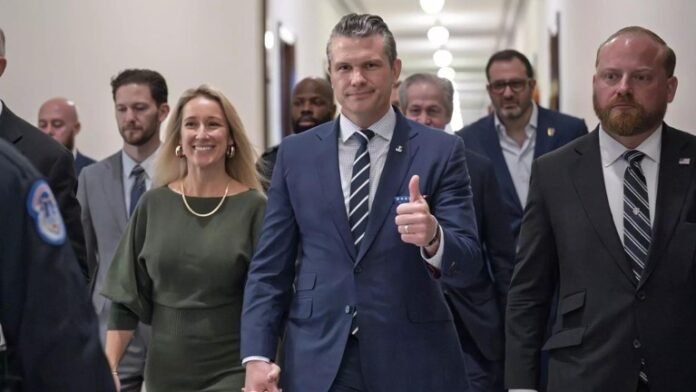Pete Hegseth, a prominent Fox News personality known for his outspoken conservative views, is set to make a significant appearance before the U.S. Senate today, pledging to instill a strong “warrior ethos” within the Pentagon if confirmed for his new role. The confirmation hearing marks a pivotal moment in Hegseth’s political trajectory, as he aims to take on a leadership position that will influence military policy and direction. However, his nomination has stirred controversy, with critics questioning whether his past statements and approach to leadership will align with the values of the U.S. military.
Hegseth’s public career has often been marked by his unapologetic patriotism, aggressive defense of American military policies, and disdain for what he sees as the erosion of traditional values in American institutions. A former Army National Guard officer, Hegseth’s resume includes a mix of military experience and a long tenure as a media figure. His appearance in conservative media circles has made him a divisive figure, but it is his stance on military culture that has generated particular attention. As he heads into his Senate confirmation hearing, his pledge to embrace the “warrior ethos” is both a declaration of his vision for the Pentagon and a point of contention for those who oppose his appointment.
The “warrior ethos,” a term often associated with military discipline and commitment, emphasizes the need for resilience, strength, and an unwavering sense of duty among service members. For Hegseth, this concept is central to the military’s future, and he has argued that the Pentagon’s leadership must foster an environment where combat readiness and strength are prioritized above all else. In his prepared remarks, Hegseth is expected to highlight his belief that the U.S. military needs leaders who not only understand the demands of modern warfare but also embrace a mindset that upholds values of honor, courage, and tenacity.
However, Hegseth’s interpretation of the “warrior ethos” has drawn sharp criticism. Opponents of his nomination argue that his rigid, combative approach to leadership could exacerbate the already challenging dynamics within the military. They point to his previous comments on topics such as political correctness in the armed forces, the need for a more aggressive posture in international conflicts, and his controversial stances on issues like diversity and inclusion as signs of a potentially toxic leadership style. Critics fear that his uncompromising view of military culture might contribute to an environment that overlooks the need for innovation, adaptability, and sensitivity in addressing the diverse needs of both military personnel and global security challenges.
Hegseth’s public persona has been one of fierce nationalism and bold rhetoric, but this has not always translated well into the world of diplomacy and military strategy. His critics highlight past comments where he dismissed the importance of diversity and inclusion programs within the military, calling them distractions from the core mission of defending the nation. In his view, the military’s focus should be on mission readiness and the battlefront, not on fostering a more inclusive environment. His past remarks on topics like the Black Lives Matter movement and his embrace of far-right talking points have fueled concerns among those who believe he may not be suitable for a leadership position in the Pentagon.
Despite the controversies surrounding his nomination, Hegseth has garnered significant support from some quarters. His advocacy for a more aggressive defense posture and his call for a military that prioritizes combat readiness resonate with certain factions within the conservative establishment. These supporters believe that his military experience and no-nonsense approach to leadership are precisely what the Pentagon needs in a time of rising global tensions, particularly with adversaries like China and Russia. They argue that Hegseth’s straightforward and unapologetic stance on military readiness aligns with the United States’ strategic interests, particularly in the face of evolving security threats.
As the Senate confirmation hearing unfolds today, Hegseth is likely to face intense questioning from both sides of the aisle. Senators will likely probe his views on military leadership, readiness, and the role of the Pentagon in global security. His pledge to foster a “warrior ethos” will be closely scrutinized, as the committee weighs his suitability for the role.
If confirmed, Hegseth would be stepping into a critical position at a time when the U.S. military is undergoing significant transformations. The debate surrounding his nomination reflects broader concerns about the future of the armed forces, particularly in relation to issues of leadership, military culture, and the evolving nature of warfare. While Hegseth’s supporters view him as a strong leader who will revitalize the Pentagon’s commitment to strength and readiness, his critics worry that his leadership style could reinforce divisions within the military and hinder its ability to adapt to the complex challenges of modern defense.
As the Senate hearing continues, the question remains whether Pete Hegseth’s vision for the Pentagon, rooted in a strict interpretation of the “warrior ethos,” will be the right fit for an institution that must balance military strength with the evolving needs of a diverse and increasingly globalized world.

